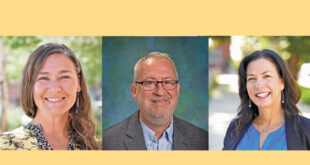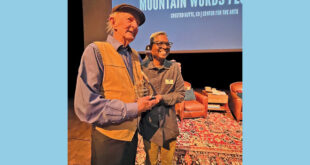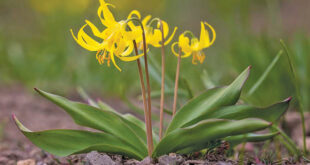Greenman Forever
By Dawne Belloise
In leafy intricate detail, the inked image of a Greenman unfurls across Kyle “Squirl” Ryan’s back, the tendrils, leaves and limbs framing the ancient face. Squirl got his tattoo after being declared Vinotok’s Greenman of 2016, and the title and reign changed his perspective and life. “I’ve always thought it is the greatest honor that Crested Butte has to offer,” he reflects. “For me, Greenman is not a destination or single honor, but the beginning of a transformation,” and with that crowning, Squirl launched his journey of inner personal and spiritual change.

“Greenman, above all else, is a transformation, a rebirth, a life-long journey, one that I am glad to be on and one that I am forever grateful to the ladies of Crested Butte for sending me on,” he said. “They acknowledged something inside of me that I had long ignored, then supported me with love, and stuffed me so full of mojo that I became a new man.” Although his one-year reign ended with the autumnal equinox crowning of a new Greenman, the glow of the experience remains.
Squirl spent his childhood in the Finger Lakes region of upstate New York, in the small village of Bath. Growing up on a lake, he had sailboats, rowboats, canoes, and ski boats. In the summer, he’d wake early, before 6 a.m., and hit the water when it was like glass, skiing in those clear, lush mornings. He had his first job at 13 and earned his Eagle Scout status by 15.
Both of his parents were educators. His mom taught kindergarten and his father was director of special education. He and his older sister, Thea, fought like cats and dogs, according to Squirl’s recollections, until she went off to college and the two realized they actually had a lot in common. As a kid, he was a determined inventor. “Anything that my parents threw away I would take out of the trash to make stuff. There’d be a lot of electricity involved, and unintentional shocks. I learned the hard way,” he laughs and one can picture him as Data in the Goonies, always rigging up contraptions.
“I used to strap model rocket engines to my toy cars. It worked great and it was very loud—and there were flames,” he grins. His teddy bear would get launched from floor to floor in the house, strapped into a homemade custom parachute entirely engineered by Squirl. So, of course, as he went through school with an eye on the future, Squirl knew his path was that of an engineer. He just wanted to make stuff. “I’ve been breaking things down in my head from 3D into 2D and back again all my life,” he says. “In my mind, I can picture space and product and how they interact. It’s how I see the world.”
He took his first architecture class in high school at 13, and spent most of those years studying technical and digital arts, as opposed to the fine arts, although, he says, the two disciplines connected for him later, in college. In high school, he had completed every AP course that would transfer into college credit and felt he had maxed out of school, so he quit half way through his senior year and went to Corning Community College, enrolling in all the STEM courses—science, technology engineering and math. “It’s not for the faint of intellect,” he says, flinching about the heavy curriculum of physics, chemistry, and calculus.
As a freshman, he began as an intern working for Michael Graves and Associates. Graves was considered the founder of post-modernism in architecture and also had many products in Target stores in the early 2000s. Squirl started as a designer. He was enrolled in Clarkson University’s engineering program, but after a year and half realized that engineers don’t actually make things. “Designers tell the engineers what to make,” he says, “and the engineers figure out how, so I wanted to be on the more creative, up-front side of the process.”
He quit, returned home, and taught himself how to paint and draw, because, “An engineering background was all very technical arts and I had to embrace the hand and fine art side of things in order to get into design school.” Squirl transferred to Rochester Institute of Technology, where he learned how to create products, from ergonomics and colors to manufacturing techniques and processes. By his sophomore year, he had his own design and product on the shelves at Target.
“My very first product was stacking mixing bowls,” he says, but Squirl took issue with the planned obsolescence of marketing and the push to sell new product every year. “On the one hand, I was very proud that I was making these things and they were in stores but on the other hand, the next year there would be a new design, a new color, it’s essentially a whole new product,” he says, and he didn’t like the idea of having his creations go into the landfill.
He earned his BFA in industrial design and a minor in architecture. After graduation, Michael Graves offered Squirl a job, which he turned down. “I wasn’t into the waste, or more for more’s sake,” he said but the company saw that he was the man for another job, director of quality control, which oversees the entire line of products from curtains, sheets and furniture to plumbing fixtures, mixing bowls and tea kettles. His job sent him to Asia—China, Beijing, Hong Kong, for three weeks at a time, three times a year, to do factory tours and quality checks.
“It wasn’t very enjoyable,” he confesses. “I got to experience the kind of culture that no one wants to experience. I saw what the Apple factory’s suicide nets looked like,” he describes the harsh conditions and life that causes workers to jump out factory windows and off roofs, so much so that nets are hung to catch the divers. “You don’t have safety equipment, you don’t have checks, no regulations, no workman’s comp and all the factories over there were like that. Day after day, factory after factory, no safety procedures anywhere.” He explains that he was only there to ensure the product was being made to Target’s specifications.
After three years, Squirl quit and decided to move to Crested Butte. “I came out to ski, buying up everybody’s friend and buddy passes, every one I could get my hands on. Before I moved here, I spent every vacation day I had here. I had some Clarkson College friends who found this place while in college. I moved here before I even saw it melted out. I was here for Fat Tuesday ‘07, and I raised my hand and declared, ‘I can draw houses’ and architect Andrew Hadley hired me. I’ve been working for him ever since. I flew home the end of February, gave two weeks notice and moved out.”
He now designs houses, but he feels at odds with the growth of town. “Before, I was filling landfills with plastic and metal and now I’m filling town with houses and people,” he says. “I feel that it’s perceived as negative from folks who don’t want to see any change and I think they feel that way because there’s no updated master plan for town. People don’t know what town is going look or live like when there are 200 or 800 beds. Crested Butte South is only 30 percent built out so what does Crested Butte look like when Crested Butte South goes to 40 percent or 100 percent built out?”
Squirl’s observations, and an overwhelming encouragement from locals, led him to run for town council this summer. “I had a lot of in-depth conversations with people about their hopes, dreams and what Crested Butte means to them. It means the world to not only me, but everybody who struggles to live in this place.” He received a substantial 334 votes, just a few shy of getting a seat at the table. He has many excellent and thought-out suggestions to make the government more accessible to the townspeople, and how to keep the town from the same fate as Aspen and Telluride.
As to whether he will run again, he says, “It’s hard to say. It’s also opened my eyes to the confines you get as a councilperson. There are limits, as to quorum. You can’t hang out in threes. When you’re behind the desk, you are the town and you have to tow that line even if you don’t believe in whatever the decision is. Because I’m not on council, I’m a lot more free to change my mind, to listen to arguments and effect change on a more personal level. Being more of a free agent gives you a different voice.”
All the changes going on are part of what keeps Squirl here. “My tribe and the steeps,” he grins, are the other reasons. “I haven’t found a community that I was able to connect with and feel that I was really a part of since college, when everything’s all new and everyone’s like-minded and trying to figure out life. In Crested Butte, there’s a level of acceptance, a level of discovery, unpretentiousness, and an openness that the rest of the world doesn’t have because they’re all wrapped up in their career or the next shiny thing. Whereas, having to survive in the elements as we do, we’re more open to each other and this community, more reliant on each other. I don’t see myself leaving.”
As to his nickname and its spelling, he was dubbed Squirl by his cousin, from the time he was a teenager. “The simple answer is, I’m squirrelly. To break that down, I’ll put something in a safe place instead of where I can remember where I left it, and if you can’t choose your own nickname you should at least get to choose the spelling you want and make it your own.”
Regarding his year as Greenman, Squirl says, “I only hope to repay the honor by giving to and continually lifting up this community. When this community bestows such an immense amount of honor, love, and support onto you, it forces your intentions to attention. It forces you to acknowledge the universe, nature, and energy while giving you a feeling of security and freedom to discover a new world of possibilities. Not knowing exactly where to start this journey, I began working from a theory that if I make myself a better person then I make my tribe a stronger tribe and my community a better community. I reset my thinking, forgave, let go, and approached each day open to whatever it had to teach me, difficult as it may be sometimes. Throughout the year of insights, discussions, and discovered I was able to discard baggage, connect with my community on new and deeper levels, and at least partially let go of my social anxiety.
 The Crested Butte News Serving the Gunnison Valley since 1999
The Crested Butte News Serving the Gunnison Valley since 1999




